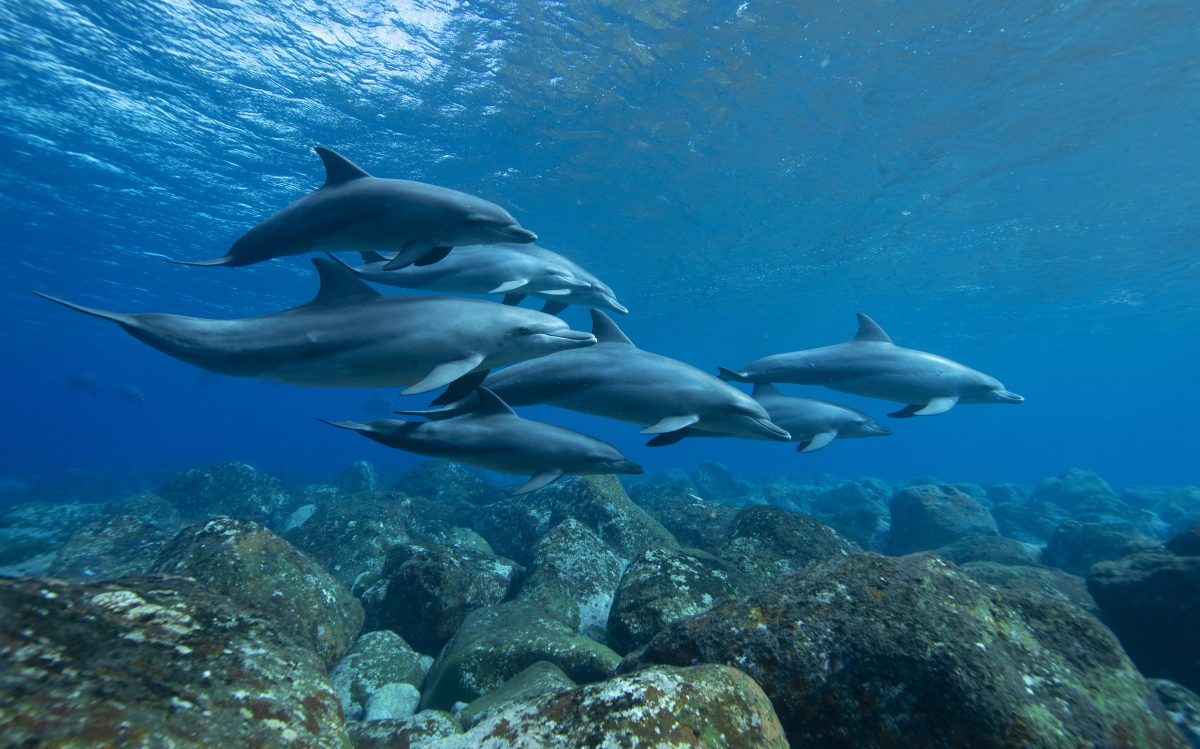Speciesism [spee-shee-ziz-uhm]: ‘the practice of treating members of one species as morally more important than members of other species’ (Britannica, 2013). Ultimately, speciesism can manifest in the preferential treatment of some species and the discrimination against others. A classic example is that of the dog and the pig: both of equal intelligence, but vastly different statuses in our society. But what about in our oceans? Here is an example of speciesism in action.
Dolphins
Dolphins are one of the most loved animals on the planet. Our initial adoration for them may have stemmed from marine parks: their acrobatic displays left us in awe; they featured on countless merchandise and in films; and false marketing around their ‘smiling face’ enabled us to relate to them (they aren’t smiling, it is just the shape of their face).
As the years have passed however, research has repeatedly blown our mind about how intelligent and sentient dolphins are: they call each other by name, grieve the loss of loved ones, save humans from shark attacks, and discipline their naughty children. Unquestionably, our fondness for dolphins today is because they are just so similar to us! This has worked in their favour, with increasing calls to free dolphins from captivity, which are described as ‘prison cells’ for an animal so intelligent. Additionally, when Netflix released Seaspiracy, much of the post-documentary outrage surrounded the revelation that dolphins were still caught by ‘dolphin-free’ tuna fisheries. There was less fuss about the tuna themselves being caught, however – an example of speciesism in action?
Tuna and other fishes
Tuna fisheries get bad press for accidentally capturing dolphins, sharks and turtles. They don’t get much bad press, however, for capturing tuna; even though a number of tuna species are in decline and are considered threatened (some more so than some of the species they accidentally capture). This is the hand dealt to ‘regular’ fishes: many cultures view them as food but think of charismatic marine animals as wildlife that should be kept off our plates. The fact that fishes feel pain and pleasure, and have more complex minds than previously thought doesn’t appear to help them either – even though these are traits which we seem to admire in dolphins.
Our lack of appreciation for fishes is also shown through the term ‘trash fish’, used to describe typically undersized fishes with low (human) food value, often used in aquaculture feed instead. But one man’s trash is another’s treasure; these smaller fishes are critically important prey for larger animals like penguins, seals, and other fishes. Likening these fishes to garbage is narrow-minded and perverse.
Because of their minimal appeal, very few large conservation organisations use fishes as marketing material. Instead, they may talk about flagship species like dolphins, sharks and coral reefs, and how the protection of them benefits other animals in the ecosystem as well. While this may be true, fishes also play an important role in the health of marine ecosystems and should be given the conservation attention they deserve – especially while issues like overfishing remain rampant.
The power of connection
Some humans struggle to connect with the ocean; it is an alien world full of alien-like creatures. But we can relate to the intelligence and sentience in dolphins, whom are considered ‘charismatic megafauna’, acknowledged to appeal to the masses. Admittedly, charismatic megafauna such as dolphins, whales, turtles, and sharks grow and reproduce slower than many other fishes, making them more vulnerable to exploitation from fisheries. But this does not justify conserving only them and seeing fishes and other marine animals, like crustaceans, solely as food. We need to re-think our perception of, and relationship with, fishes and the ocean as a whole. Otherwise, we may soon loose these important marine species.
So, how do we combat speciesism? Besides avoiding a judgemental mindset in which one species deserves conservation over another (a misconception that is simply not true), take the chance to learn more about that variety of animals in our ocean! Marine life as large as the gray whale to as small as microscopic phytoplankton all play crucial roles in the delicate balance of the ecosystem.
